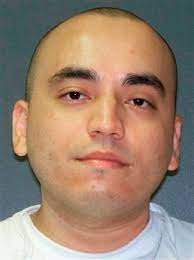Heliberto Chi was executed by the State of Texas for a murder committed during a robbery
According to court documents Heliberto Chi would go to a store where he used to work after hours and convinced an employee to let him in. Once inside of the store Chi would take the employees hostage. When the employees attempted to escape two of them were shot with Armand Paliotta dying from his injuries
Heliberto Chi would be arrested, convicted and sentenced to death
Heliberto Chi would be executed by lethal injection on August 7 2008
Heliberto Chi Photos

Heliberto Chi FAQ
When Was Heliberto Chi Executed
Heliberto Chi was executed on August 7 2008
Heliberto Chi Case
A convicted killer from Honduras could not be saved from a trip to the Texas death chamber despite pleas he unfairly was denied legal help from his consulate when he was arrested for killing a Dallas-Fort Worth store manager during a robbery. The execution Thursday evening of Heliberto Chi, 29, was the second death penalty case in Texas this week to focus on international treaty issues.
“God forgive them,” Chi said from the death chamber gurney. “Receive my spirit.” With a tear at the corner of his right eye, he told a cousin watching through a window that he loved him, then whispered in Spanish what appeared to be a prayer as the drugs were taking effect. His cousin, distraught, wailed in the witness area and pounded his hand on the wall of the room. Nine minutes later, Chi was pronounced dead.
Two sons of his victim, watching through a window in an adjacent room, stood stoic. Chi had glanced at them only briefly as they and other witnesses were assembling and never addressed them. Chi, an illegal immigrant from Honduras, claimed his treaty rights were violated when he was arrested in California and extradited to Texas for the robbery-murder near Dallas 7 1/2 years ago and wasn’t advised to contact the Honduran consulate for legal help.
On Tuesday, convicted Mexican-born killer Jose Medellin raised similar claims. His execution was delayed nearly four hours before the U.S. Supreme Court rejected his final appeal. Four of the nine justices dissented with the majority ruling. Thursday, the high court quickly disposed of Chi’s last-ditch efforts, rejecting him without dissent some 2 1/2 hours before his scheduled execution time. Lawyers for the state told the justices Chi had nearly six years of case review to raise his treaty claims and failed to do so. They also said evidence of his guilt was overwhelming.
“He cannot possibly demonstrate prejudice or a fundamental miscarriage of justice,” the state’s brief to the Supreme Court said. Justices responded with a terse three-line order saying his request for a stay of execution and a petition to formally review his case had both been rejected, clearing the way for the sixth execution this year in the nation’s busiest death penalty state.
Chi was convicted of killing Armand Paliotta, 56, his former boss at a men’s clothing store during the March 2001 robbery. Chi worked as a tailor at the store in Arlington, between Dallas and Fort Worth.
Unlike Medellin, executed for the participating in the gruesome gang rape and murders of two teenage Houston girls 15 years ago, Chi was not among some 50 death row inmates around the country, all Mexican born, who the International Court of Justice said should have new hearings in U.S. courts to determine whether the 1963 Vienna Convention treaty was violated during their arrests. Legislation to implement the process was introduced recently in Congress, but the Supreme Court ruled earlier this year neither President Bush nor the international court could force Texas to wait.
Chi’s attorneys argued that unlike the Vienna Convention obligations with Mexico, the 1920s-era U.S. Bilateral Treaty of Friendship, Commerce and Consular Rights with Honduras was specifically between the U.S. and Honduras and was self-executing, meaning it didn’t require legislation to have effect. The treaty also conferred individual rights and incorporated international law into enforceable domestic law, they said. Terry O’Rourke, a lawyer on Chi’s legal team who teaches international law at Houston’s University of St. Thomas, said he was saddened Texas was violating international law to execute Chi. “It takes you back to a very ugly time in history in Texas when we killed people because of the color of their skin and their poverty,” he said.
Chi had visited the suburban Dallas store late in the afternoon the day of the robbery, then returned after closing and was let in by Paliotta after saying he’d left his wallet behind. Once inside, he pulled out a gun and demanded a money bag. Paliotta was shot and killed. Another employee was wounded trying to run away and a third hid among clothing racks and called 911 for help. On a recording of the call played at his trial, Chi can be heard calling the hiding employee, in Spanish, to “Come to the front” of the store. With police on the way, he fled a few minutes later, jumped into a waiting car and sped off.
He was arrested in Reseda, Calif., northwest of Los Angeles, about six weeks later. His 18-year-old pregnant girlfriend had turned him for assaulting her and told authorities he was wanted for murder in Texas. The couple had been on the run, crisscrossing the country.
Chi was set to die last September, but his execution was stopped because the Supreme Court was looking into whether lethal injection procedures were unconstitutionally cruel. When the justices earlier this year upheld the method as proper, his date was reset for Thursday. The getaway driver at the murder scene, Hugo Sierra, who is the brother of Chi’s girlfriend, is serving a life prison term.
Four other Texas prisoners are set to die this month, including two more next week. They’re among at least 15 Texas inmates with execution dates in the coming months







